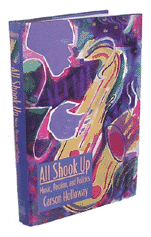|
In Mr. Holloway's view, the current debate over popular music is impoverished by the victory of modern liberalism
(i.e., Enlightenment thinking), with its indifference to questions of music and character. He believes we have a
lot to learn from Rousseau, Nietzsche and the ancient Greeks. They understood, above all, that music itself has
an extraordinary effect on the character of the young, quite apart from the words it accompanies.
In this light, Mr. Holloway faults contemporary critics for putting so much emphasis on the objectionable lyrics
of certain songs. He also suggests that the spiritual shallowness of modern liberalism is what drives the young
to seek fulfillment in ever more ecstatic and violent musical experiences, which they falsely hope will give
meaning to their empty lives. Ultimately, he sides with Plato and Aristotle and against Rousseau and Nietzsche,
in calling for a kind of music that will "calm the passions with a view to the noble rule of reason in the soul
and the city."
Despite this ardent wish, his practical proposals turn out to be surprisingly mild. He does not favor censorship,
which he considers "utterly alien to the spirit of American politics." He merely encourages parents to try to
persuade their children not to listen to the most coarse kinds of popular music.
More broadly, Mr. Holloway thinks we should acknowledge that liberal modernity is spiritually empty and incapable
of satisfying our children's longings for moral and intellectual fulfillment. The solution is apparently a classical
education in "the musical political philosophy of the ancients." Yet that would entail, admits Mr. Holloway, "a
radical transformation in our understanding of what we are, what the universe is, and how we are related to it." A
tall order indeed.
The great virtue of "All Shook Up" is its unfashionable insistence that music be taken seriously, as it once was
by the classics of Western political philosophy. It should be said, however, that Mr. Holloway's capsule summaries
are sometimes superficial. Plato and Aristotle, in particular, come across as na´ve -- foolishly confident that
listening to the right kind of simple music is all it takes to tame the "many-headed beast" in the human soul.
For a far richer presentation of these thinkers, one should turn to Allan Bloom's "The Closing of the American
Mind," a book to which Mr. Holloway is clearly indebted though he acknowledges it only grudgingly and hypercritically.
"All Shook Up" might have been more powerful, too, if Mr. Holloway had offered more specific musical examples. As
it is, his argument is quite abstract, and the reader is left to imagine what kinds of music have good or bad effects
on the soul and why. For vivid and compelling reflections on pop culture and the human soul, the reader would do
better to consult any page of the writings of Camille Paglia. Still, "All Shook Up" points us in the right direction.
Mr. Schulman teaches at St. John's College in Annapolis, Md.
| |
